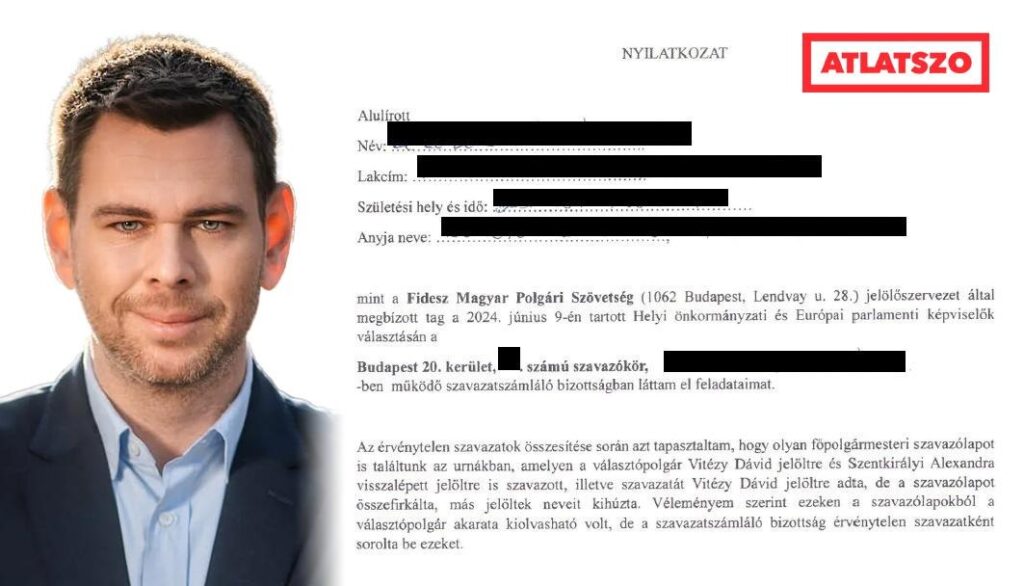The https://english.atlatszo.hu use cookies to track and profile customers such as action tags and pixel tracking on our website to assist our marketing. On our website we use technical, analytical, marketing and preference cookies. These are necessary for our site to work properly and to give us inforamation about how our site is used. See Cookies Policy
District Fidesz offices collected statements for Dávid Vitézy’s appeal for recount
Mayoral candidate David Vitézy submitted 226 statements to the Budapest Election Commission (BEC) on June 12 that supported his call for a recount. The statements, given by the vote counters, claimed that invalid votes were wrongly counted in their polling stations. Ironically, however, it emerged on June 14 that more than half of these statements – at least 114 – were false. Further investigations revealed that these identically worded statements were encouraged by the Fidesz offices in the districts. In fact, Fidesz did more than encourage – in some cases, they wrote the statements themselves and had counters sign the dotted line. Some signed without reading. Others cannot remember signing at all.
Vitézy filed an appeal on June 12 to the BEC that called for a recount of all invalid votes in Budapest. The 226 supporting statements signed by counters claimed that ballots with crosses next to both Alexandra Szentkirályi’s and David Vitézy’s names were incorrectly counted as invalid. Vitézy would have received fewer votes than he should have.

As previously reported, many of these statements were identical in wording. Other statements lacked witness signatures.
The issue was brought before the National Election Commission. Members elected by the Fidesz-controlled Parliament and delegates from Fidesz, KDNP, Mi Hazánk, Jobbik and LMP voted in favour of a recount.
The recount on June 14 revealed that no election outcome was affected by votes that were wrongly considered invalid. Gergely Karácsony won the mayoral elections with 41 votes.
But more than half of the 226 statements submitted by Vitézy – 114 – were false.
The investigation
A reader requested the petition through the FOIA request platform KiMitTud and received a PDF in response. At least 47 statements claimed that ballots with crosses next to both names were wrongfully invalidated in their polling stations.
Vitézy_hamis-nyilatkozatok_… by atlatszo
An additional 67 statements claimed that ballots with a mark next to any candidate’s name and Szentkirályi’s name were also wrongfully invalidated. The recount revealed that there were no such ballots that were mistakenly invalidated.
Perhaps the vote counters had hazy memories.
The Fidesz of it all
If we were concerned, David Vitézy issued a statement to assuage our fears.
“It is only with ill intent that one could now, three weeks after the recount of invalid votes, suggest that some polling station delegates intentionally made false statements at the time,” he said. “When this issue arose, we approached polling station delegates one by one, and many wrote on their own. Municipal and party delegates, opposition, and government party members alike. […] Considering the tight deadline, we sent out sample declarations to those who asked for help with drafting a legal text, which they could of course modify as they wished.”
And yet – call it neuroticism, or overkill, even – our fears doggedly persisted.
The statements we obtained had personal information already filled in, along with changing details based on each district – for convenience, no doubt. The statement issued by Fidesz seems slightly more than a template – it seems like a ready-made statement, just waiting to be signed.
Lest we be hasty in our judgment, we contacted randomly selected vote counters to inquire about the process.
They told us that they had been approached by Fidesz two days after the election with the template.
One counter – a confirmed Fidesz supporter – recalled: “On election day, a Fidesz politician from my electoral district approached me to thank me for my work. He left, but he called the next day. I went out, and he handed me an A4 paper to sign that stated that we found several invalid ballots.”
“I’ll be honest” she said, “there are times when I would sign anything you put under my nose without reading it, really. I didn’t read the paper. I signed it.”
Another counter from a Buda polling station, who also submitted a statement, shared a similar experience. “They called me from the Fidesz office,” they remembered. “They said that the distinction between valid and invalid votes wasn’t clear and had changed. They said there was a ready-made statement to sign if we wished.”
A seasoned counter from a Pest polling station said that she had signed the declaration because “there must have been some invalid votes marked wrongly” – but no mistakenly invalidated votes were found in her station. She confirmed that a Fidesz contact had reached out to her to sign.
Another counter denied signing any statement at all, and asked us to verify the signature.
A man from a Pest polling station that had no mistakenly invalidated votes said that he signed the statement.
“I signed, but I also said that I’m not entirely sure it’s accurate, and I could have been misremembering,” he said. “I didn’t want to cause anyone any harm. My employer came, told me that everything would be recounted and they’d be going around, so I should sign it because that’s just the way things are done.”
What does it all mean?
A member of the NVB told us that, if indeed Fidesz offices collected these statements and several of them turned out to be false, the governing party has “effectively manipulated the recount process”. “The recount required reopening the sealed ballot boxes, which potentially leads to post-electoral errors,” they noted. Although the invalid vote recount did not alter the election outcome, the Constitutional Court could still invalidate the result if there was any post-election tampering during the recount.
The process risked weakening the trust in the elected mayor – and it was all for naught, under false accusations encouraged by Fidesz.
“The moral responsibility lies primarily with Fidesz,” they told us, “And then, the vote counters who participated. If he wasn’t misled, Vitézy also bears significant responsibility.”
It’s just the way things are done.
Translated by Vanda Mayer. The original, Hungarian version of this story was written by Tamás Bodoky and Zsuzsa Zimre and can be found here and here.
Share:
Your support matters. Your donation helps us to uncover the truth.
- PayPal
- Bank transfer
- Patreon
- Benevity
Support our work with a PayPal donation to the Átlátszónet Foundation! Thank you.
Support our work by bank transfer to the account of the Átlátszónet Foundation. Please add in the comments: “Donation”
Beneficiary: Átlátszónet Alapítvány, bank name and address: Raiffeisen Bank, H-1054 Budapest, Akadémia utca 6.
EUR: IBAN HU36 1201 1265 0142 5189 0040 0002
USD: IBAN HU36 1201 1265 0142 5189 0050 0009
HUF: IBAN HU78 1201 1265 0142 5189 0030 0005
SWIFT: UBRTHUHB
Be a follower on Patreon
Support us on Benevity!

